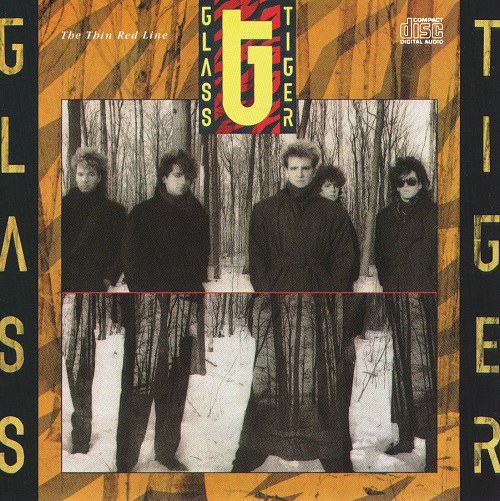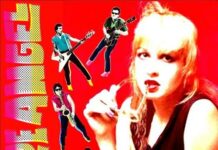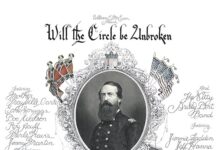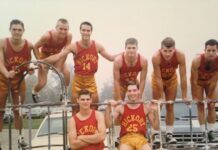In less than a decade’s time, the phrase “Take my breath away” made three separate musical acts pop luminaries in the states, albeit for microcosmic moments.
In 1979, teen mainstay Rex Smith hit the Billboard Top 10 with an emotive balled entitled “You Take My Breath Away,” setting him on a course of longevity across music, television (Solid Gold) and theater (The Pirates Of Penzance). Seven years later, the phrase would resurface again as new wave band Berlin enveloped it in moody synthesizers and all but put it in the mouth of Tom Cruise in the film Top Gun. The result was the band’s lone Number One hit, and an Academy Award to boot.
Merely a month later, a U2-esque quintet hailing from Ontario, Canada, used the lyric as the opening line for its own biggest hit song. Though they would miss the top spot on the charts courtesy of Janet Jackson, Glass Tiger helped solidify the Great White North’s stature as a solid assembly line of mass musical talent. Yet while “Don’t Forget Me (When I’m Gone)” and the band’s accompanying album The Thin Red Line were hits in the moment, their staying power shouldn’t be overlooked. Both are prime specimens of pure Canadian power pop — clean, crisp, and catchy all the while, essentially carrying the torch carried by husky-throated Bryan Adams who would become a superstar the year earlier with his multi-million selling Reckless album and its five Top 15 singles.
More on that later…
Released in 1986, The Thin Red Line would go gold in the U.S., garnering Glass Tiger a Grammy nod for “Best New Artist” (they lost to Bruce Hornsby and the Range) and Junos for “Album of the Year,” “Single of the Year (twice!),” and “Most Promising Group.”
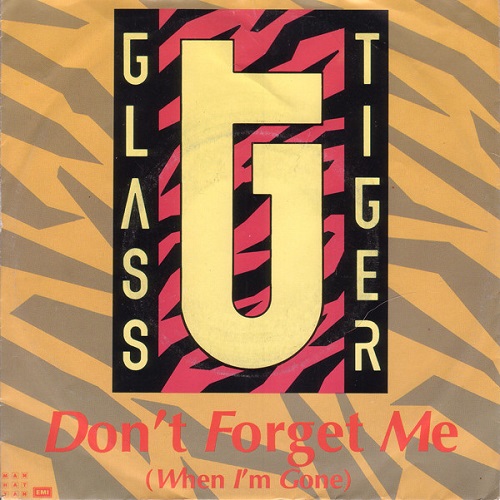
Band frontman Alan Frew recently told me that success in America — regardless of how long it would last — was a collective group goal from day one.
“I had grown up on the sort of British invasion when I was back in Scotland watching bands like the Beatles and the Who and Herman’s Hermits, the Rolling Stones — all trying to conquer America. Of course, U2 had always made a sort of splash about how they felt that the Mecca was America. And I don’t think there was any doubt that we were no different,” Frew said. “We were a Canadian band, but we had our sights set on inevitably conquering the U.S. for sure.”
For Glass Tiger — loosely named after George Plimpton’s seminal autobiographical sports work Paper Lion — conquering the U.S. took four years, from basement rehearsals to gigging in bars as Tokyo throughout Ontario. Even when record label interest came their way, it wasn’t without barriers. Island founder Chris Blackwell thought the group sounded too much like U2, already on the label at the time. Additionally, Capitol Records wanted to sign the group without four of its members, setting its sights on the Scottish Frew as a solo artist.
“I think we were the only band at the time that ever played the famous Maple Leaf Gardens unsigned and we opened up for Boy George and Culture Club in front of 20,000 people each night. That was on a Friday and Saturday and on the Monday I got the call from Capitol and…[they] said, ‘OK if I want the cherries, I’ll have to take the whole fucking pie. Get down here!’” Frew said. “We went down and signed with Capitol.”
Apart from the aforementioned Adams, Canada was a musical behemoth throughout the early-to-mid 1980s with groups like Rush, Saga, Triumph and Loverboy going gold time and time again. To help turn Glass Tiger into a global band, Adams’ songwriting partner — former Prism member and Canadian producer extraordinaire — Jim Vallance would work with the group on its debut album in Vancouver.
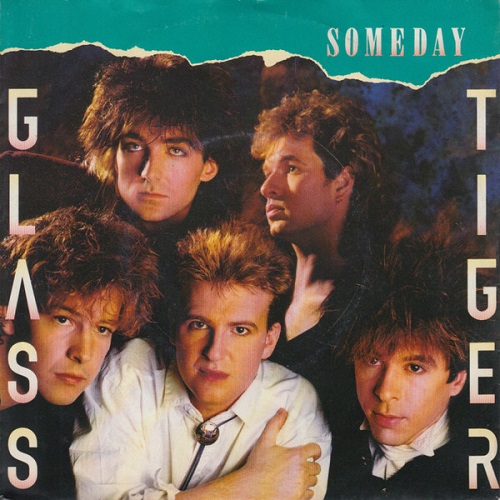
After inquiring which bands Glass Tiger was listening to at the time, Vallance and band members stopped at a record store to pick up relevant albums and study them for songwriting ideas. For reference, this is on day one of the recording experience. Thus, we enter the genesis of how “Don’t Forget Me (When I’m Gone)” and the group’s follow-up hit “Someday” come to fruition. Per Frew:
“(Vallance) put on Tears for Fears’ Songs From The Big Chair and of course the big song was “Shout” and we were listening to that. Suddenly on came “Everybody Wants to Rule the World.” Vallance went, ‘Oh shuffle beat!’ And he runs over to the drum machine and he starts a shuffle beat and he just starts dabbling on keyboard. I immediately I go as if it’s a verse ‘Don’t forget me when I’m gone.’ And I’m just hacking around this idea and the other guys are joining in. Vallance says, ‘That line, don’t forget me when I’m gone is incredibly cool – let’s lift it and store it.’ So we do. I’m dabbling with the whole ‘You take my breath’ thing until I come up with a melody and he goes now slot it in and I go ‘Don’t forget me when I’m gone.’ So we start writing “Don’t Forget Me (When I’m Gone),” it’s the first thing we ever started with Vallance.
“Then to add to the folklore, [band members] Sam [Reid] and Al [Connelly] were smokers at the time and they needed a cigarette break and Vallance was very, very particular. He didn’t even want you standing outside his window. He says, ‘Go for a walk if you’re going to smoke near my house.’ So the boys set off on a little walk and Vallance gets behind the keyboard and he does this little thing and I immediately go “When I come home…” and we start writing “Someday.” By the time the boys come back we’ve now started to write the two biggest hits the band ever had on our very first attempt with Vallance. We came home with “Don’t Forget Me (When I’m Gone)” and “Someday.”
Adams himself would give Glass Tiger a musical boost — and some easily detectable rasp — while in town for the 1985 Juno Awards by not only contributing vocals to “Don’t Forget Me” but also the powerful, rallying track “I Will Be There.”
“We’re having a lovely time. We started drinking some Heinekens; we’re getting along by axe and fire and I don’t know whether it was contrived by Jim somehow or if it was just casual. Jim says to the two guys with Heinekens, ‘Boys, why don’t you go on the microphone and just fart around and see what comes out,” Frew told me. “At the time I don’t think any of us were really thinking much about it. Bryan had hit the big time, but he wasn’t the way we think of him today, like this mega, mega superstar. It felt really comfortable.”
But it’s important to note that The Thin Red Line boasts several other great tracks apart from the two soon-to-be giant hits. Politically charged songs like the driving “The Thin Red Line” (based on the Argyll and Sutherland Highlanders) and the Apartheid-influenced “Vanishing Tribe,” are just two examples.
The album would take approximately six months to complete. While we can seemingly think that the success of “Don’t Forget Me” was immediate, its ramp-up to Billboard dominance could actually be attributed to the song’s success in regional northern U.S. markets — as a B-side.
“What happened was ‘Don’t Forget Me (When I’m Gone)’ was becoming a mega hit in Canada and it was bleeding across the border. Detroit and Buffalo and Minnesota and Seattle, these stations were saying, ‘Oh fuck this ‘Thin Red Line’ single; we want ‘Don’t Forget Me (When I’m Gone).’ What happened with us was sales were going through the roof but the airplay was going through the roof in the border stations. We were already being at Number Two and Number One in Buffalo and Seattle and by the time it makes its way in the Midwest and California and Florida, there was an imbalance,” Frew said. “If everybody had done what they should have done and released ‘Don’t Forget Me (When I’m Gone)’ as the first single in North America, there’s no doubt it would have been a Number One Billboard smash.”
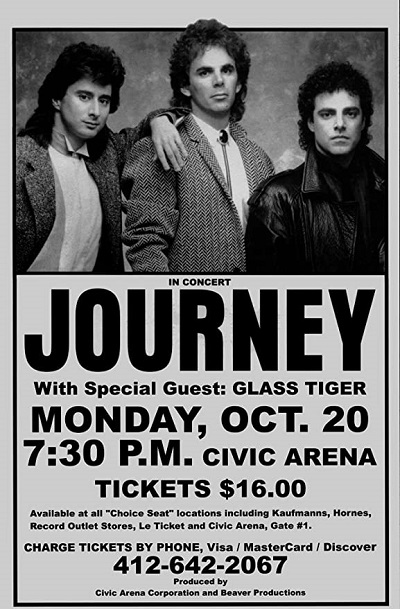
Still, the band was able to revel in the success of the single, as well as its Number 7 smash “Someday.” The group would gain further exposure opening for Journey during the height of their Raised On Radio success.
“It was a perfect moment. We couldn’t wait — Journey were megastars but we put bums in seats,” Frew said. “So as we started to play in America there was a big Glass Tiger contingent. You could see more and more in the audience there was a lovely crossover between fans of both bands. It was perfect.”
Yet after the commercial success and the bevy of Junos now in their arsenal, Glass Tiger would find any future success tied to regions outside of America. Their follow-up album Diamond Sun (1988) would go double platinum in Canada. While the album’s title track has “become a much beloved song all over the world but it never had the impact it should have had back in the day,” Frew told me. The band would also get to perform a song, “My Town” with Rod Stewart, which went Top 40 in the UK. After the release of 1991’s Simple Mission (as a four-piece), Glass Tiger would go on hiatus.
“We remained friends, but we sort of put the shutters up on the windows and we closed the door for a while and I tottered off and did a lot of solo stuff,” Frew said.
But the group is still roaring, having released its fifth album 33 in early 2019. Embracing its status as a “nostalgic band,” Frew hopes the time will come when they can reclaim some of that hard-fought U.S. glory that made them darlings of the American airwaves for a brief, lovely moment nearly 35 years ago.
If they do make it to the States — post-pandemic, of course — I can assure you I will be there.
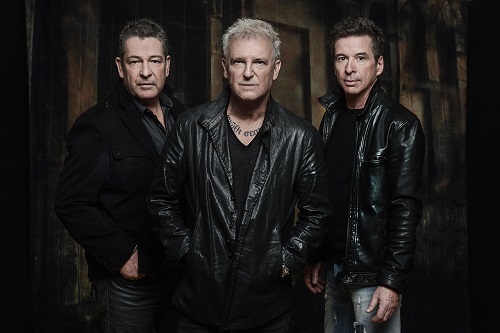
Band photo courtesy of Denise Grant
***
Share your feedback and suggestions for future columns with Ira at vinylconfessions84@gmail.com.


